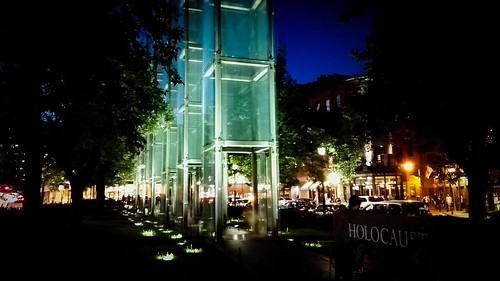Guest column: Holocaust fading from view in eyes of many, studies show
Holocaust #Holocaust

On Saturday, people around the globe observed International Holocaust Remembrance Day, the anniversary of the liberation of Auschwitz.
Sadly, the commemoration resonates differently this year, as it is no longer axiomatic that average Americans will recall the 1.1 million Jews who perished at the notorious death camp. The reasons are manifold and they predate the current war between Israel and Hamas. Holocaust denial, politicization, indifference and renewed Jew-hatred had been surging before Hamas and other Iranian-directed proxies began the latest efforts aimed at the total destruction of Israel.
Since the massacres of Oct. 7, cries of “gas the Jews,” “burn the Jews” and more have rung out across cities around the globe. These perverse calls, meant to evoke the gas chambers of Auschwitz, are a startling inversion of the facts that occurred on Oct. 7, the bloodiest day in Jewish history since the Holocaust.
One thousand two hundred mostly Jewish Israelis died in a brutal slaughter that included burning victims to death in their homes, bodily mutilation, violent rapes and the mass kidnapping of innocent civilians and soldiers, acts that recall the worst episodes in a long history of Jewish victimhood.
Counterintuitively, a flood of antisemitic vitriol has followed, and these hateful responses fit perfectly with the latest depressing statistics regarding Holocaust literacy. Despite concerted efforts to teach American students about the Holocaust, according to a recent poll conducted by The Economist/YouGov, one in five Americans under 30 think that the Holocaust is a myth. The results are consistent with a 2020 study conducted by the Conference on Jewish Material Claims Against Germany and a 2019 Pew Research Center survey, which both revealed “significant gaps in knowledge about the Holocaust” among millennials, in particular.
The stubborn refusal to sympathize with Jewish slaughter maps on to growing denial and distortion of the Holocaust, which these polls sadly confirm. One might expect that many young Americans have learned something about the Holocaust in school, as 23 states mandate its teaching. Resources for teachers are widely available. Yet the polls suggest that these efforts have proven insufficient or ineffective. We need research to uncover why.
Longitudinal studies might help us to better understand best teaching practices. For instance, are we asking too much from teachers and students? In many classrooms, the Holocaust is used as a means to teach lessons related to civics, human rights and genocide. Historical facts could easily be subsumed under the weight of so many pedagogical demands. Moreover, precious classroom time may not allow teachers to cover the subject adequately.
The learning that takes place in the limited time available at school is fragile compared to the significant attention students devote to social media. We don’t need research to know that young people are forming opinions based upon the content that TikTok influencers create. Millennials are much less interested in reading credible news outlets grounded in impartial reporting that observes journalistic standards. They may not even recognize that they are swayed by opinions that are not fact-based. Lessons learned in school don’t stand a chance against the lessons learned on social media, which are reinforced by constant scrolling.
In addition to the impact of social media and ineffective pedagogy, trends in K-12 education may also be undercutting learning about the Holocaust. As Francesca Block recently detailed in The Free Press, antisemitism is widespread in New York City schools.
One culprit that may help to explain the current climate is the Culturally Responsive-Sustaining Framework that the New York State Education Department introduced in 2018, which is identity-based and begins as early as pre-K. This learning approach resembles California’s Ethnic Studies Model Curriculum that, as many observers have lamented, includes anti-Israel and antisemitic content. The focus on “decolonizing the curriculum” can reduce complex history to a binary that codes groups into simplistic categories of oppressor vs. oppressed. Block points to the latest Harvard Harris poll, which illustrates the results of such thinking and identifies a growing tendency among younger Americans to see Jews as oppressors.
Just as elite institutions of higher education are grappling with an epidemic of antisemitism on their campuses, K-12 educational systems must address the fears that Jewish students, parents and teachers have expressed. School curricula that elide Jewish experience or code Jews as oppressors may be factors in fostering the repugnant attitudes toward Jews that we have witnessed in the aftermath of Oct. 7.
The state of Holocaust education and its seeming failure may turn out to be a useful barometer for whether Jewish students, as well as teachers, feel seen and safe at school. What we are observing today is reminiscent of the way teachers and professors during the Third Reich indoctrinated students in the National Socialist world view. Ironically, we don’t seem to have learned that lesson.
Mary Jane Rein is executive director of the Strassler Center for Holocaust and Genocide Studies at Clark University.
This article originally appeared on Telegram & Gazette: Mary Jane Rein on Holocaust Remembrance Day and rising antisemitism